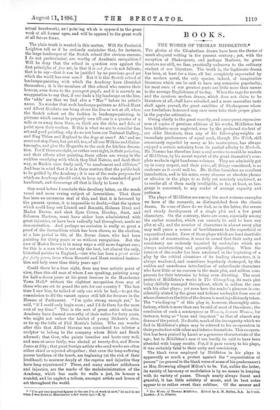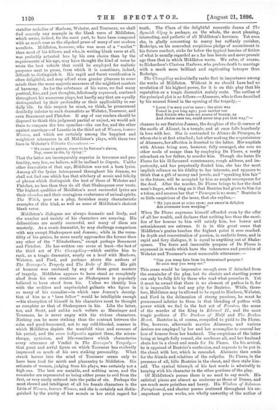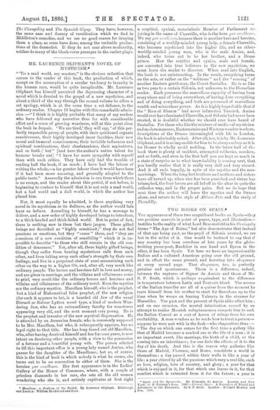BOOKS.
THE WORKS OF THOMAS MIDDLETON.* THE glories of the Elizabethan drama have been the theme of much eloquent writing in the present century ; yet, with the exception of Shakespeare, and perhaps Marlowe, its great masters are still, we fear, practically unknown to the ordinary student of our literature. The truth is, the legitimate drama has been, at least for a time, all but completely superseded by the modern novel, the only species, indeed, of imaginative literature which can be said to have any extensive popularity, for most even of our greatest poets are little more than names to the average Englishman of to-day. When the rage for novels and the spnrions modern drama, which does not claim to be literature at all, shall have subsided, and a more masculine taste shall again prevail, the great satellites of Shakespeare whom our forefathers honoured may once more take their proper place in the popular estimation.
Owing chiefly to the great scarcity, and consequent expensive.
ness of copies of previous editions of his works, Middleton has been hitherto more neglected, even by the professed student of our older literature, than any of his fellow-playwrights or immediate predecessors of equal rank, though The Witch, still erroneously regarded by many as his masterpiece, has always enjoyed a certain notoriety from its partial affinity to Macbeth. Mr. Nimmo has therefore done a real service to would-be readers of Middleton, by his recent reprint of the great dramatist's com- plete works in eight handsome volumes. They are admirably got up in every respect, and their price, all things considered, is as moderate as it could well be. Mr. Bullen furuishes an excellent introduction, and in his notes, every obscure or obsolete phrase or allusion in the plays is so fully yet concisely explained, as to render all of them easily intelligible, so far, at least, as lan- guage is concerned, to any reader of average capacity and patience.
The plays of Middleton are among the most extreme examples
we have of the romantic, as distinguished from the classic drama. In none of them do we find, as in the latter, the severe and steady development of a single plot and a few great characters. On the contrary, there are some, especially among the earlier comedies, which can scarcely be said to have any plot at all; and the number of characters in almost every play may well prove a source of bewilderment to the superficial or unpractised reader. Even of those plays which are least inartistic in point of construction, it must be owned that their unity and consistency are seriously impaired by underplots which are always uninteresting and generally disgusting. When the interest of the reader has been awakened in the beginning of a play by the critidal situations of its leading characters, it is always weakened, and sometimes hopelessly destroyed, by the sudden and unwelcome introduction of subordinate characters who have little or no concern in the main plot, and seldom com- pensate for their intrusion by being even diverting. The most perfect of Middleton's works is The Changeling, its main plot being skilfully managed throughout, which is seldom the case with his other plays ; yet even here the reader's pleasure is con- siderably abated by the gross and tedious underplot from one of whose characters the title of the drama is most injudiciously taken. The " winding-up " of this play is, however, thoroughly satis- factory, which is more than can be said of most of the others ; the conclusion of such a masterpiece as Women, beware Women, for instance, being as "lame and impotent" as that of almost any drama of the period. No doubt, much of the incongruity which we find in Middleton's plays may be referred to his co-operation in their production with other and inferior dramatists. This co-opera- tion has been praised by Lamb as a generous characteristic of the age; but in Middleton's case it can hardly be said to have been attended with happy results. For, if it gave variety to his plays, it was certainly fatal to their unity and consistency.
The blank verse employed by Middleton in his plays is
apparently as much a protest against the " sequestration of pauses" (so general in the blank verse of some of his predecessors) as Mrs. Browning alleged Milton's to be. Yet, unlike the latter, its variety of harmony or modulation is by no means in keeping with its variety of pause. Though nearly always fluent and graceful, it has little subtlety of music, and its best notes appear to us rather sweet than sublime. Of the severer and • The Works of Thomas Middleton. Edited by A. H. Haan. B.A. In 8 Tots. London: J. C. 2:Immo. statelier melodies of Marlowe, Webster, and Tourneur, we shall find scarcely any example in the blank verse of Middleton, which seems, indeed, for the most part, to have been composed with as much ease as the slipshod prose of many of our modern novelists. Middleton, however, who was more of a " realist " than most of his fellows, and who, in writing blank verse at all, was probably actuated less by his own choice than by the requirements of his age, may have thought the kind of verse he wrote the best vehicle that could be employed for realistic purposes next to prose, from which it is sometimes, indeed, difficult to distinguish it. His rapid and fluent versification is often delightful, and may afford even greater pleasure to some minds than the more majestic measures of the mightiest masters of harmony. As for the substance of his verse, we find many poetical, fine, and just thoughts, felicitously expressed, scattered throughout his numerous plays, but hardly any that are equally distinguished by their profundity or their applicability to our daily life. In this respect he must, we think, be pronounced decidedly inferior to such dramatists as Webster, Tourneur, and even Beaumont and Fletcher. If any of our readers should be disposed to think this judgment partial or unjust, we would ask them to compare the two speeches—the one for, and the other against marriage—of Leantio in the third act of Women, beware Women, and which are certainly among the happiest and weightiest utterances in all Middleton's plays, with these two lines in Webster's Vittoria Corombona:- " We cease to grieve, cease to be fortune's slaves,
Nay, cease to die, by dying !"
That the latter are incomparably superior in terseness and pro- fundity, very few, we believe, will be inclined to dispute. Unlike other dramatists of that age, Middleton was not a born lyrist. Among all the lyrics interspersed throughout his dramas, we shall not find one which has that witchery of music and felicity of phrase which distinguish the best of those of Webster and Fletcher, no less than they do all that Shakespeare ever wrote. The highest qualities of Middleton's most successful lyrics are their abandon and their contagious exuberance of animal spirits. The Witch, poor as a play, furnishes many characteristic examples of this kind, as well as some of Middleton's choicest blank verse.
Middleton's dialogues are always dramatic and lively, and the number and variety of his characters are amazing. His delineations are mostly successful, and many of them are masterly. As a comic dramatist, he may challenge comparison with any except Shakespeare and Jonson ; while in the versa- tility of his genius, he more nearly approaches the former than any other of the "Elizabethans," except perhaps Beaumont and Fletcher. He has written one scene at least—the last of the third act of The Changeling—which entitles him to rank, as a tragic dramatist, nearly on a level with Marlowe, Webster, and Ford, and perhaps above the authors of The Revenger's Tragedy and The Duke of Milan. His gift of humour was unshared by any of these great masters of tragedy. Middleton appears to have stood as completely aloof from his own creations as Shakespeare is popularly believed to have stood from his. Unless we identify him with the reckless and unprincipled gallants who figure in BO many of his comedies—in which case Jonson's descrip- tion of him as a base fellow" would be intelligible enough —his absorption of himself in his characters must be thought as complete as that of Shakespeare in his. Like the latter, too, and Scott, and unlike such writers as Messinger and Tourneur, he is never angry with his vicious characters. Nothing can be more striking than the contrast between the ealm and good-humoured, not to say cold-blooded, manner in which Middleton depicts the manifold vices and excesses of his period, and the emus indignatio against them, the misan- thropy, cynicism, and life-weariness which characterise every utterance of Vindici in The Revenger's Tragedy,— that great and awful figure on which Tourneur has evidently impressed so much of his own striking personality. What struck horror into the mind of Tourneur seems only to have been food for mirth and pleasantry to Middleton. His estimate of women, judging from his plays, was certainly not a high one. The best are amiable, and nothing more, and the remainder are represented as being either prone to evil from the first, or very easily seduced into the paths of sin. Perhaps the most shrewd and intelligent of all his female characters is the Livia of Women, beware Women, and she is certainly not distin- guished by the purity of her morals or her strict regard for truth. The Clara of the delightful romantic drama of The Spanish Gipsy is perhaps, on the whole, the most pleasing, interesting, and pathetic of all Middleton's heroines. Yet even she, in gladly consenting to marry her ruffianly ravisher, Roderigo, on his somewhat suspicious pledge of amendment in his future conduct, sinks far below the typical heroine of fiction of what is usually regarded as a far less heroic and more prosaic age than that in which Middleton wrote. We refer, of course, to Richardson's Clarissa Harlowe, who prefers death to marriage
with a much more brilliant and captivating betrayer than Roderigo.
The Changeling undoubtedly ranks first in importance among the works of Middleton. Without it we should have had no revelation of his highest power, for it is on this play that his reputation as a tragic dramatist mainly rests. The outline of the principal plot is as follows :—Alsemero, who is thus described by his nearest friend in the opening of the tragedy,— "Lover I'm Bare you're none ; the stoic was
Found in you long ago; your mother nor Best friends who have set snares of beauty, ay And choice ones too, could never trap you that waf,"— chances to see Beatrice-Joanna, the daughter of the Governor of the castle of Alicant, in a temple, and at once falls hopelessly in love with her. She is contracted to Alonzo de Piracquo, to whom she is at first attached ; but after making the acquaintance of Alsemero, her affection is diverted to the latter. Her nuptials with Alonzo being now, however, fully arranged, she sees no other mode of escape than by employing De Flores, a needy attendant on her father, to murder him. Though she hates De Flores for his ill-favoured countenance, rough address, and im- portunity, and has perpetually flouted him, she has the most implicit reliance on his fidelity to her interests, and appears to think that a gift of money and jewels, and "speaking him fair" in the future, will be accepted by him as ample recompense for the deed. After the murder, De Flores brings to her the dead man's finger, with a ring on it that Beatrice had given to him for a token, and assures her that " Piracquo is no more." Beatrice is so little suspicions of the issue, that she replies,-
" My joys start at mine eyes ; our sweet'st delights Are evermore born weeping."
When De Flores expresses himself offended even by the offer of all her wealth, and declares that nothing less than the sacri- fice of her honour to him will satisfy him, her horror and astonishment are extreme. It is in this great scene that Middleton's genius touches the highest point it ever reached. In depth and concentration of passion, in realistic force, and in rapid and fiery dialogue, it is equal to anything out of Shake- speare. The fierce and inexorable purpose of De Flores is expressed in words which have the vehemence and precision of Webster and Tourneur's most memorable utterances :—
" Can you weep fate from its determined purpose ? So soon may you weep me."
This scene would be impressive enough even if detached from the remainder of the play, but its electric and startling power can only be fully felt by those who read what precedes it. Yet it must be owned that there is no element of pathos in it, for it is impossible to feel any pity for Beatrice. While, there- fore, Middleton may be allowed to be equal to Marlowe, Webster,
and Ford in the delineation of strong passions, he must be pronounced inferior to them in that blending of pathos with power which we find in the last act of Faustus, the scene of the murder of the King in Edward II., and the most tragic portions of The Duchess of Milli and The Broken Heart. Beatrice is, of course, compelled to yield to De Flores. She, however, afterwards marries Alsemero, and various
devices are employed by her and her accomplice to conceal her
loss of honour from her husband. The suspicions of the latter being at length fully roused, she confesses, all, and her husband shuts her in a closet and sends for De Flores. On his arrival, he is apprised of Beatrice's confession, and requests to be put in the closet with her, which is conceded. Alsemero then sends for the friends and relatives of the culprits. Da Flores, in the
presence of all, kills Beatrice in the closet, and then stabs him- self. The cynical triumph of his last words is admirably in keeping with his character in the other portions of the play.
Of Middleton's poems there is no need to say much. His satirical pieces are almost as scabrous as those of Donne, and are much more pointless and heavy. His Wisdom of Solomon. Paraphrased, and shorter poems scattered throughout his un- important prose works, are wholly unworthy of the author of The Changeling and The Spanish Gipsy. They have, however, the same ease and fluency of versification which we find in Middleton's comedies, and we see no good reason for denying them a place, as some have done, among the veritable produc- tions of the dramatist. If they do not soar above mediocrity, neither do many of the blank-verse passages in the earlier plays.




































 Previous page
Previous page